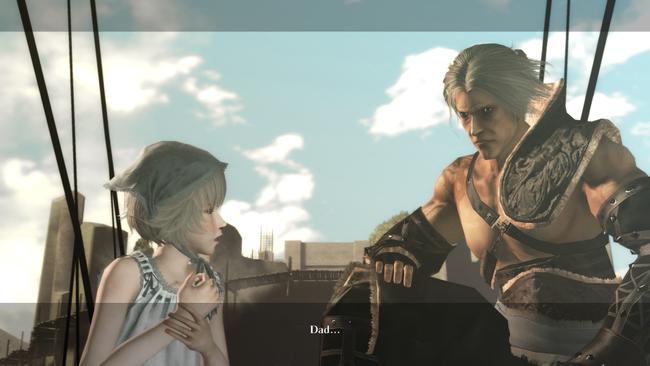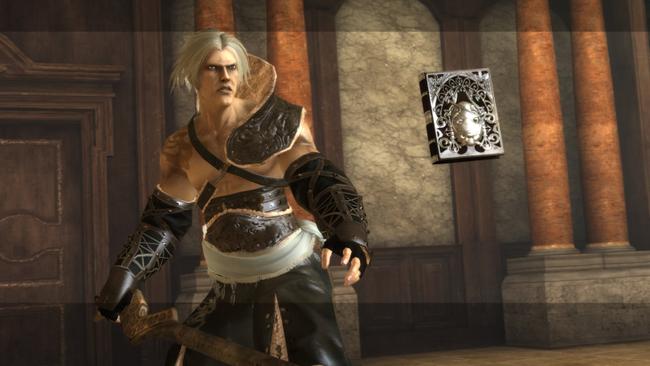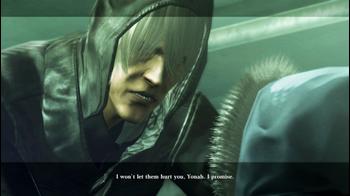
Decade Memoir #4: Cullen Black - NieR

Before I finally got around to trying it myself, I spent years hearing NieR be described as a “bad game with a good story.” It put me off from giving it a chance for years until the summer of 2017, where I was able to borrow it from a friend after NieR: Automata caught my (and everyone else’s) eye. I’ve never played a game quite like NieR and I’m not sure I ever will.
Automata is a wonderful game and a great sequel, but there’s something about the original that will always be special to me. It’s impressive just how much Yoko Taro was able to accomplish with so little. While it has its fair share of flaws, is a perfect dissection of the video game medium.
NieR has a very simple premise, almost deceptively so. The game stars the titular Nier, a father (in the Gestalt version) trying to keep his sickly daughter Yonah safe and happy in a dying world. He discovers a magical, talking book one day, and the book teams up with Nier to help find a cure for Yonah’s illness. As they travel around the world searching for a cure, the players get to learn about the various cultures that inhabit it and meet two new people that eventually join them: Emil and Kaine. It all sounds like a very generic premise for an RPG on paper, but that’s sort of the point.
The feeling that something is wrong with all of this is prevalent from the beginning. The world Nier and his friends explore, which has now become one of my favorite settings ever in a game, is littered with the destroyed architecture of a dead civilization. It all feels… off.
The presentation and camera feel designed to make the player uncomfortable, but the characters and story are so well written that I couldn’t pull myself away from it. Almost every single place you visit has a unique gameplay style to it and it makes them all memorable. There’s a mansion you visit that feels straight out of a horror game and a forest where the entire story is told in the form of a visual novel. Some people might find this as poor game design, that Yoko Taro was just being indecisive, but I completely disagree.
Yoko Taro decided to make a video game that commented on video games, breaking them down to their core and highlighting genres that interested him. There isn’t a single moment that I felt like I was playing a game designed and written by a committee. NieR feels personal in a way that few games manage to achieve. He plays with RPG tropes in an authentic way, while still keeping the plot simple.
The overworld is expansive yet ultimately empty, with enemies strewn about to add small amounts of life. These lonely fields, hills, forests, and deserts only add more to the brilliant atmosphere, perfectly painting a picture of a desolate world. However, there’s a dark, otherworldly beauty to the environments - probably largely due to Keiichi Okabe’s brilliant soundtrack. It’s hard to describe it to someone who has never heard his style before. I think it’s safe to say that there’s really nothing else like it.
I rather enjoyed the combat system too. It’s incredibly simple, but it’s far from bad. People who go from the smooth battle system PlatinumGames designed for Automata might find it archaic. I see it as charming in its simplicity.
Criticism has often been brought up against the game’s route system, where players have to replay the second half of the game a few times and meet a set of requirements to reach the true ending. It’s easy to brush it off as padding the game for length due to budget restraints, but the execution was handled so excellently that it feels deliberate.
What Yoko Taro accomplished with this structure, which I personally feel NieR: Automata replicated to lesser effect, is a story themed around recontextualization. Specifically, how people warp their perceptions around half-truths, fundamental misunderstandings, and a lack of context to do horrible things in the name of what they think is right. Through all of the first route, we’re led to believe things are a certain way and are given a simple ending that feels satisfying for the narrative we’ve been woven.
It’s not until Route B that another side of the story is gradually revealed and conveys just how twisted the motivations for everyone really is. It’s the events of this part of the game that made me realize just how brilliant of a storyteller Yoko Taro is and cemented him as one of my favorite developers in the industry.
The game never once mentions that after Route B, you have to find every weapon in the game to get the true ending. I admit that I was frustrated at the idea of such a grind. As I explored every nook and cranny of the world searching for the weapons (with the help of good ol’ GameFAQs, of course), I began to realize that there was a point to all of this. Similar to another flawed game I absolutely adore, Shin Megami Tensei IV, this part exists to get you to fully understand everything about the world. Weapons are mostly tied to quests given to you by NPCs and all these quests are important for world-building. The quests are almost always tragic, but you come to understand the perspectives of the peculiar people living in the world of NieR.
What ties a bow to the game’s message for me is that at no point do any sides of the conflict ever become aware of the full truth. Everyone is stuck in an endless cycle of conflict, a very fitting reflection of humanity. It shows a lot of restraint to do this and even the main character doesn’t learn everything. Nier’s simplicity might be the most tragic, yet commendable thing of all. At the end of the day, he’s just a man trying to keep his daughter safe. That might seem confusing to you, but the weight of that statement won’t truly resonate with you unless you’ve finished the game.
The ending, which I won’t spoil, is probably the most Yoko Taro thing to ever exist and I absolutely adore everything about it. This is something that could only be done in the video game medium, perfectly driving everything home. I cried and then sat there for hours reflecting on how many layers there were to make that ending work so well.

Call me pretentious, but NieR is a game that needs to be played to really appreciate everything it has to offer. It’s certainly not for everyone; if you can look past a simplistic combat system and some tedium, you’re in for an unrivaled experience. Two years have passed since I’ve played it and I still think about it. NieR is an important game that shaped how I viewed fiction as a whole and the entire medium.
I hope to have a drink with Yoko Taro one day and pick his mind. He seems like he’d be fun to drink with.

